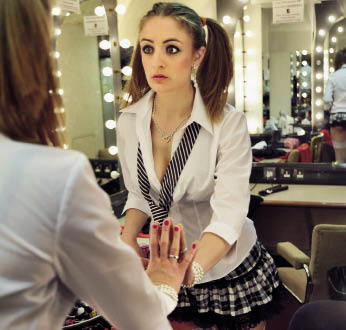Uber Hate Gang
Underbelly
Little Black Bastard; Stripped
Gilded Balloon
The Tailor of Inverness
Udderbelly Pasture
Ginger and Black
Pleasance
And it’s getting bigger. Amazing as it sounds, the Edinburgh Festival keeps expanding like a slum landlord. Every year half a dozen cobwebbed halls and disused assembly rooms are forced open, spruced up and pressed into service for the ragamuffin hordes of wannabe superstars. It’s getting harder to find your way round, too. Luck was against me when I set off for Uber Hate Gang, an acclaimed masterwork from ‘Britain’s hottest young theatre company’ at the Underbelly. I found it all too easily. The dank, cold, unlit venue smelled of rotting knitwear and, if I’d sat there in the dark twiddling my thumbs and breathing TB fumes for an hour, I’d have had more fun than watching this pretentious muddle. The Gang want to unleash a sophisticated howl of protest against some unnamed fascist power but they succeed only in delivering a ceaseless barrage of infantile nastiness. Pity I didn’t get lost on the way.
Luck was still against me when I set off to see Death of a Theatre Critic. In my haste to cross North Bridge I was nearly killed by a speeding bus. (Grieving relatives would have been consoled by the amusing inscription on my gravestone.) I reached the location on time but was bamboozled by strange signposting and ended up in the wrong queue so I never learnt how my fictional colleague met his end. When arriving at a venue with multiple entertainments the best policy is to approach an usher and repeat the name of your show with an upward inflection. A title like Little Black Bastard makes this process trickier than it need be. The show is an oral memoir by Noel Tovey, an Aboriginal actor born in Melbourne shortly before the war. Though he was beaten, vilified and sexually abused throughout his childhood, he was also shown kindness and love. Nuns took him in. Hospitals treated him. The Air Force trained him as an officer cadet and a TV company gave him his own kids’ show to host. Australia in the 1950s was less intolerant than we realised.
The Tailor of Inverness is a memoir by Matthew Zajac, whose Polish father was swept up in the convulsions of September 1939. Zajac describes prewar Poland as a haven of religious freedom. Catholic and Greek Orthodox congregations happily shared the same church and everyone left the Jews to themselves. Then along came Hitler and the killing started. No one can quite explain why. It just happened. Hate got hip. The worst atrocities, he says, were perpetrated by teenagers. Zajac crossed Europe several times trying to return home and was conscripted into four separate services along the way. He must be the only man in history to have served in the Polish, Russian, German and British armies. Imagine the pensions!
For me, the festival’s nicest surprise was Ginger and Black: The Chill Factory. This witty crime spoof is performed by two clever, stylish, supercool and extremely funny young comedians. The gods have smiled almost too munificently on G&B and they shrewdly redress the balance by mocking their good looks mercilessly. These guys are seriously good. At their best they rival Woody Allen but poor marketing deprived them of decent audiences. Their publicity material shows them pouting earnestly like Rive Gauche existentialists. And the blurb begins, ‘Ginger and Black enter Her Majesty’s Prison to hear haunting, harrowing tales from inmates.’ Sound interesting? To me, it does. Prison theatre, or slam-dram as it’s sometimes known, can be fascinating and I went along expecting a slice of documentary reality. Chaps, sort your labels out. The festival has 2,000 shows. Clear titling is crucial.
A show called Stripped reveals how it’s done. Label, picture and blurb are seamlessly integrated. Stripped is a fascinating account of life inside a lap-dancing club. Funny, polished and crammed with entertaining vignettes, the show also features an unexpectedly touching romance between a hard-as-nails stripper and a sweet old gent called Geoffrey. It sounds sickly sweet but the affair has the ring of authenticity.
I loved the show’s lack of self-righteousness and animosity. As a documentary it reveals exactly how lap-dancing operates. Gullible innocents like me are inclined to believe the official propaganda that the clubs aren’t brothels. After all, they have a purity pledge enshrined in their rule book. Any girl caught peddling private entertainment to a client faces instant dismissal. The dancers themselves confirm that the prohibition is strictly enforced. But here’s how it works. The club discovers that a girl has been treating a punter to a ‘massage with a happy ending’ at a hotel. She’s threatened with the sack but if she pays a £1,000 fine, she gets to keep her job. The girl knows she can earn this sum back in a few days whereas establishing herself in a new club may cost her a fortnight’s work at least. So she pays up and avoids the loss of earnings. The fine, which is effectively extortion, can be imposed precisely because of the purity pledge. The club is pimping. The law can’t touch it. The beauty, ingenuity and shameless dishonesty of this dodge make it very nearly a work of art.







Comments